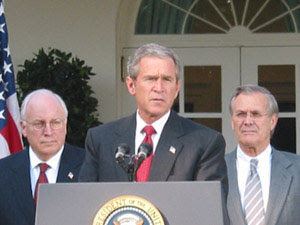These Human Rights abuses have not only damaged the US reputation around the world, the methods employed did not yield good intelligence.

In a recent interview with ABC News, Vice President Dick Cheney confirmed that, in the period after the 9/11 attacks, the Bush administration embraced a policy of torturing suspected al Qaeda detainees. Cheney did not refer to the Bush administration's practices as "torture." In fact, he insisted that "we don't do torture. We never have." He did admit, however, that he had supported the waterboarding of 9/11 mastermind Khalid Sheikh Muhammad. Waterboarding -- a technique in which water is poured over a prisoner's face to simulate drowning -- is considered torture under international law and has been prosecuted as a war crime by the United States. According to Malcolm Nance, a counterterrorism expert and former instructor and chief of training at the U.S. Navy's Survival, Evasion, Resistance and Escape school, waterboarding "is torture, without doubt."
Torture Doesn't Work: In a recent story in Vanity Fair, journalist David Rose reports that the conclusion of numerous counterterrorist officials he spoke to is "unanimous: not only have coercive methods failed to generate significant and actionable intelligence, they have also caused the squandering of resources on a massive scale through false leads, chimerical plots, and unnecessary safety alerts."
The use of torture has made Americans less safe. Former Air Force interrogator and author of How to Break a Terrorist Matthew Alexander (a pseudonym) recently wrote that "the No. 1 reason foreign fighters flocked [to Iraq] to fight were the abuses carried out at Abu Ghraib and Guantanamo." Alexander, who used non-violent methods of interrogation to obtain information on the whereabouts of terrorist leader Abu Musab al-Zarqawi, argued, "Our policy of torture was directly and swiftly recruiting fighters for al-Qaeda. ... Torture and abuse cost American lives."
Torture Is A Violation Of Our Laws And Values: Arguments about the practical utility of torture distract from the more important point that torture is a violation of U.S. law, and its use represents a significant abdication of the U.S. commitment to human rights. The U.S. federal anti-torture statute, formally known as Title 18, Part I, Chapter 113C of the U.S. Code, "defines the crime of torture and prescribes harsh punishments for anyone who commits an act of torture outside of the United States." Alexander wrote "there's no doubt in my mind" that the tactics allowed by the Bush administration "are illegal." The U.N. Committee Against Torture has been very clear in demanding that the U.S. "should rescind any interrogation technique...that constitutes torture or cruel, inhuman or degrading treatment or punishment, in all places of detention under its de facto effective control, in order to comply with its obligations" under the U.N. Convention Against Torture and Other Cruel, Inhuman or Degrading Treatment or Punishment.
Holding Perpetrators Accountable: The Bush administration's embrace of torture marks a significant reversal of decades of U.S. policy. Back in 2006, then-senator Barack Obama said that torture "is not how a serious Administration would approach the problem of terrorism," and declared the use of torture to be "a betrayal of American values." While Vice President-elect Biden didn't rule out future prosecution of Bush administration officials involved in torture, he made clear yesterday that "President-elect Obama and I are not sitting thinking about the past. We're focusing on the future." Whatever legal course is chosen by the new administration to deal with recent abuses, the damage done to America's reputation by the use of torture -- making a mockery of U.S. claims to uphold human rights -- has been incalculable.
![Reblog this post [with Zemanta]](http://img.zemanta.com/reblog_e.png?x-id=6d4ee31e-f07c-4171-be4f-abadb4edf9c9)

No comments:
Post a Comment